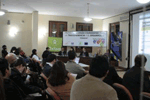Paraguay: Poor people pay much more taxes than the rich
Published on Fri, 2011-06-24 09:32
Sources: Centro de Documentación y Estudios, Diario Al Día, Decidamos (Campaña por la Expresión Ciudadana). One of the “huge mistakes” defended “as great truths” in Paraguay is that businesspeople “pay a lot” to the revenue service while in fact “direct taxation, which is the most unfair, is the largest” and “poor people end up paying more than the rich”, according to a report by economist José Carlos Rodríguez. The report was presented this month at the launching of the programme “Impuestos justos para inversión social” [Fair taxes for social investment] promoted by the Campaña por la Expresión Ciudadana-Decidamos (national focal point of Social Watch) and Centro de Documentación y Estudios. The report by Rodríguez entitled “Análisis del sistema tributario en el Paraguay y potencial de recaudación” [Analysis of the tax system in Paraguay and its collection potential] also questions statements such as the following as “mistakes”: “that the private sector is going to replace the State in the provision of public goods”, “that the money that is not spent on taxes is the money that is invested”, “that competitiveness can be developed without a State that provides basic goods and makes public investments” and “that social equity is the natural consequence of market action and public inaction”. “In such an evading culture – or simply due to fiscal laziness – those who can and certainly do evade taxes, accuse the officers that they themselves bribe of corruption”, warned the expert, whose report was prepared as part of the project “Alianza ciudadana para la transparencia y el desarrollo–Paraguay” [Citizen Alliance for Transparency and Development] supported by Oxfam and co-funded by the European Union.
The report consists of a detailed analysis on the Paraguayan tax system, identifying current tax modalities, the structure of the tax system, the destination of investment and its consequences for the persistence of poverty and inequality. Furthermore, it includes proposals aimed at achieving tax justice and breaking the vicious circle formed by a State with poor social investment capacity, massive poverty, tax evasion and the concentration of resources in economic power groups. According to this research study, one of the historical causes of “economic fragility in Latin America” is “extreme inequality”, which explains why the region has the world’s highest “crime rate”. Rodríguez reminded that, according to the United Nations Economic Commission for Latin America and the Caribbean (ECLAC) “not only is it necessary to grow to make equal, but also [...] to make equal to grow”, being thus the tax system “the most powerful mechanism to bring about social equity in a gradual, permanent and systematic way”. “Paraguay’s tax burden (12.2 per cent of GDP) is lower than the Latin American average (16 per cent) and nearly halves that of Mercosur (23.6 per cent). It cannot be said that this low taxation is due to the fact that Paraguay is a poor country whose per capita income amounts to nearly $4 billion. Countries with a per capita GDP equivalent to that of Paraguay, such as Bolivia, Honduras, Morocco, Georgia and Armenia, have a tax burden between 14.7 and 21.8 per cent of GDP. Careful IMF estimates indicate that the country should have a higher tax collection”, he added. “Not only do Latin America and Paraguay tax poorly, but they also tax unfairly. Direct taxation, which is the most unfair, is the largest. Indirect taxes are regressive. Those who are taxed can transfer taxes to the end consumer and thus the poor end up paying more than the rich. Latin America pays 9.6 per cent in indirect taxes and Paraguay 9.4 per cent. We pay proportionally more indirect taxes than the United States, although a bit less than Europe [...]. Among the developed countries, the United States collects 16.8 per cent as direct taxes, a figure near to the 16.4 per cent collected by Europe and 15.3 per cent by the OECD. Latin America collects 5.6 per cent as direct taxes and Paraguay collects 2.1 per cent of GDP as direct taxes”, he concluded. The presentation of Rodríguez’ report coincided with the launching of the tax justice campaign promoted by Decidamos and Centro de Documentación y Estudios on June 10, in Asunción. On that occasion, these organizations, among many others of the Paraguayan civil society, produced a document voicing their demand for a tax system based on the collection principle according to which “those who have and can do more have to pay more” and on the public spending principle of “investing more and investing better” in favour of those who have been left behind, particularly the poor that account for nearly 35 per cent of the population. Among many other institutions, this document was endorsed by Central Unitaria de Trabajadores (CUT); Amnesty International-Paraguayan Section; Coordinadora Nacional de Mujeres Rurales e Indígenas; Peace and Justice Service (SERPAJ-Paraguay); VOCES Paraguay-Asociación de Radios Comunitarias y Medios Alternativos; Centro de Estudios en Derechos Humanos, Niñez y Juventud; Universidad Católica Nuestra Señora de la Asunción; Coordinadora de Derechos Humanos del Paraguay; Coordinadora Nacional de Organizaciones Campesinas e Indígenas del Paraguay; Confederación de Religiosos del Paraguay; SOS Children’s Villages Paraguay; and Agrupación de Familiares de Detenidos Desaparecidos y Asesinados del Paraguay. More information: Análisis del Sistema Tributario en el Paraguay y Potencia de Recaudación.
» |
SUSCRIBE TO OUR NEWSLETTER



